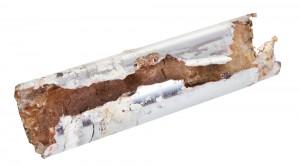Every Central Florida pool owner is familiar with chlorine, the chemical we all love to treat the pool with on a regular basis (insert sarcasm here). You are also made aware from time to time that municipal water systems use chlorine to kill bacteria and pathogens for safe drinking water. Those times are typically when your treatment plant increases the chlorine level, and you get a good whiff of it when you turn on your tap in the morning. However, while the chlorine in the water supply won’t harm you (despite the occasional strong odor), it can damage copper pipes.
How so? Chlorine and copper piping have an uneasy relationship. Chlorine reacts with the piping to create a chemical compound: copper chloride. This compound gradually corrodes copper from the inside, resulting in tiny – yet destructive – pinhole leaks. Left unrepaired, they can damage your home plumbing system and swimming pool, depending upon which pipes are affected. While most swimming pools now use PVC piping, copper pipes are common in older pools.
Detecting pinhole leaks in pools
Even with PVC pipes, other types of leaks are prevalent in pools. The trick for those with copper pipes is in determining if the piping is the cause, rather than another source. Our DIY Test for Swimming Pool Leaks offers several methods – such as the evaporation or bucket test, or pool pump on-or-off leak test – to learn if your pool is using an excessive amount of water and to narrow down the possible cause.
Pinhole leaks in other plumbing

Pinhole leaks can affect all copper piping. An article by George Brazil Plumbing and Electrical, Phoenix, AZ, takes an informative look at the problem, and answers common questions – beginning with the obvious: “What causes pinhole leaks in copper pipes?”
Copper pipes can leak due to turbulence, which may occur because of high water velocity or fittings that are too close together. However, pitted corrosion – which attacks pipes from the inside – is the main reason.
Other causes of pinhole leaks
In addition to high chlorine levels in the water supply, the following factors can cause pitted corrosion:
- High pH level in the water supply
- Accumulation of corrosion particles from a rusted water heater
- High water pressure
- Other microbial activities in the soil and water
It is difficult for homeowners to detect pitted corrosion without professional expertise until it becomes a pinhole leak. For home plumbing leaks, look for the following indicators:
- Green spots around pipes
- Dimpled/weathered appearance of pipes
- Increased water bill with no apparent change in water use habits
- Dripping sounds
- Discoloration of walls; water stains on walls
- Mold and mildew growth
Pinhole leaks in copper pipes – repair or replace?
Calling a plumber is the next step if you suspect pinhole leaks. If your plumber confirms the problem, there are two options, depending upon the location of the leaks and/or age of the pipes. Leaks located on the solder joints, elbow, or tees can be repaired. Repair can also be cost-effective if the pipes are under 20 years old, or all of the leaks are in the same pipe. Otherwise, replacement may be the better option.
Should your plumber recommend replacement or total re-piping, the copper pipes will most likely be replaced with PEX pipes. Again, follow your plumber’s recommendation, which will be based upon your individual situation and property conditions. If your plumber determines your copper pipes can be repaired, you may want to install a water filtration or softening system to prevent future pinhole leaks.
No matter what the cause of swimming pool leaks, our Certified Leak Detection team is ready to provide fast, accurate detection and expert repairs – as well as regular maintenance Contact us for help, or to learn more about our services.

